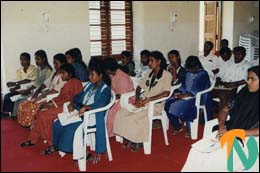Official apathy, malnutrition plague Trinco refugees
[TamilNet, Wednesday, 14 March 2001, 21:30 GMT]
(NEWS FEATURE) Over 75 percent of refugee children under five living in conflict zones of the northeastern province suffer from malnutrition, according to preliminary surveys by government and NGO officials presented at a three-day workshop inaugurated Wednesday morning at Trincomalee Town Hall under the auspices of Sri Lanka's Ministry of Planning and Implementation. The surveys indicate that the majority of mothers among the displaced in these regions suffer from malnutrition during pregnancy and after childbirth.
The Second Secretary (Development) of the British High Commission Ms Penny Thorpe and the Special Assistant to the Japanese Embassy Ms Aiyako Tanaka based in Colombo accompanied by the UNICEF 's Trincomalee representative Ms Gabrielli attended the inaugural event of the workshop.
Mr.N.Puhendran, Deputy Director of Planning in Trincomalee, delivered the keynote address.
"We are unable to close down welfare centers until normalcy returns. Until the displaced community returns to normal life we have to provide them with better food, health and other facilities in welfare centers," said Mr.Puhendran.
 |
| A section of the resident volunteers from Welfare Centers in Trincomalee district now undergoing training in the three-day workshop. Photo: TamilNet |
Mr.T. Thuraisingham, Deputy Director of Planning, in his opening address outlined the objective of the training. Dr.E.G.Gnanakunalan of the Northeast Provincial Ministry of Health also spoke.
About thirty girls selected from the displaced community in the welfare centers as volunteers are participating in the workshop.
There are fifteen refugee camps Trincomalee district. There are 4099 persons belonging to 1091 families residing in these centers. All were displaced due to the war.
Widespread malnutrition among women and children is mainly due to the dearth of nutritious food and the lack of knowledge among the displaced in selecting the nutritious food supplied to them or bought by them.
Hence the prevalence of severe health problems and malnutrition among the displaced people, say officials.
The World Food Program (WFP) has formulated a special plan to fund the Participatory Nutrition Intervention Program (PNIP) of the UNICEF to improve the level of nutrition among the WFP assisted beneficiaries.
This special program is being implemented in the Vavuniya, Trincomalee and Mannar districts in the northeast province.
The objectives of this special program is to alleviate the problem of malnutrition through nutrition education and to introduce ways of increasing household food security through activities such as home gardening in welfare centers.
WFP officials decided to train selected girls from the welfare center community as volunteers to educate the elders in the displaced community about malnutrition and how it could be overcome.
Workshops are being held in these three districts to train these volunteers.
As a part of this program in Trincomalee district, a three-day workshop for the resident volunteers was inaugurated this morning.
About thirty female resident volunteers from welfare centers functioning at Nilaveli, Kinniya and Uppuveli are participating in the workshop. This is the second batch of resident volunteers who being trained.
After training each resident volunteer will be placed in charge of fifteen displaced families. The duty of these resident volunteers would to educate the displaced families on how to select nutritious food from what may be available in the welfare centers. These volunteers would educate the displaced to grow nutritious food by home gardening, not to depend on the other sources.
However, several displaced families complain that they are unable to buy nutritious food from the assistance provided to them in the centers.
Some say that they suffer due to the scarcity of pure water in the welfare centers.
The cyclone that hit the Trincomalee recently damaged the buildings of several centers. In some centers latrines are still without roof. Women have no privacy. Wells are not purified. Water is supplied from outside to inmates in some centers, sources said.
Fifteen welfare centers are located in four divisions in the district. Eight welfare centers are in the Trincomalee division at Allesgarden, Uppuveli, Codbay, Lovelane, Kallarawa, Jinna Nagar, Vilankulam and Mihindupura (Wilgam Vihare). Altogether 3076 displaced persons belonging to 803 families reside in these centers.
In the Kinniya division 426 persons of 113 families reside in the welfare centers at P.M.B.Store and Upparu. One centre is for Tamils and the other for Muslims.
In the Morawewa division 166 persons from 59 families reside in three centers at Mahadiulwewa and Namalwatte.
In the Kuchchaveli division 431 persons from 116 families reside in one center at Nilaveli.
 |
| UK High Commission's Second Secretary Ms Penny Thorpe, Special Assistant to Japanese Embassy Ms Aiyako Tanaka, UNICEF's Trincomalee representative Ms Gabrielli are seen with Deputy Directors of Planning T.Thuraisingham,N.Puhendran and Dr.E.G.Gnanakunalan.Photo: TamilNet |












